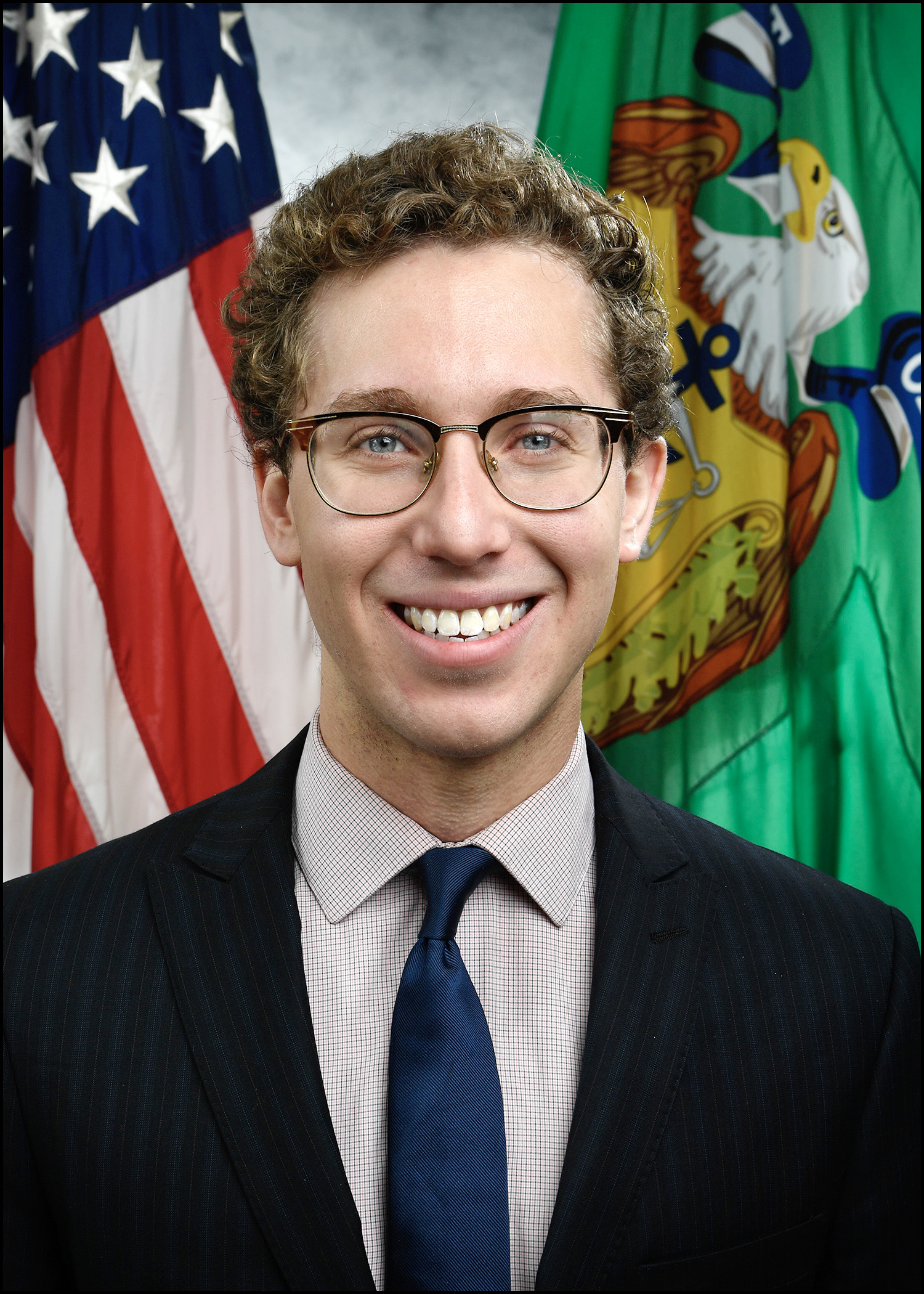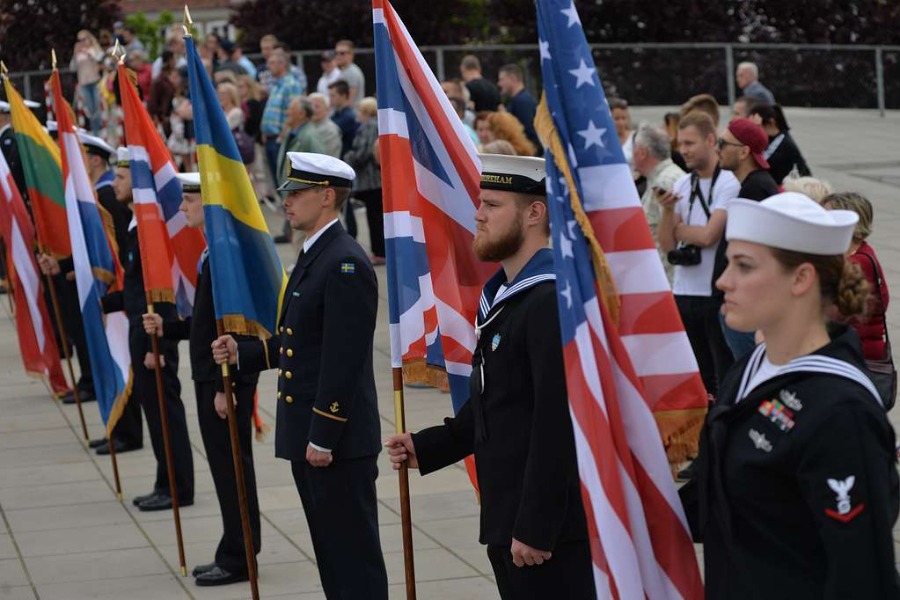Water Wars: Officials and Analysts Gather in Asia for Shangri-La, Tri-lats, and Quad-lats
.jpg?sfvrsn=e92dcb5d_5)
Published by The Lawfare Institute
in Cooperation With

Wiretapping. Resupply missions to a dilapidated navy ship in a disputed archipelago. An injured sailor. These incidents are but a snapshot of increasingly strained Philippine-Chinese relations and events in the Indo-Pacific this month, which came to a head when two ships—one Philippine and one Chinese—collided near the disputed South China Sea territory of Second Thomas Shoal on the morning of June 17.
Shangri-La Dialogue
From May 31 to June 2, military, defense, and foreign policy ministers from around the world descended upon Singapore for the 21st Shangri-La Dialogue, an annual defense summit organized by the British International Institute for Strategic Studies (IISS). During a special session on deterrence and reassurance in the Asia-Pacific, Cui Tiankai, the former Chinese vice minister of foreign affairs, discussed the importance of perceptions in a fast-changing world and how such perceptions inform approaches such as deterrence or assurance. He also emphasized the significance of building mutual confidence before listing several major global challenges, including artificial intelligence (AI) and climate change, ending his address by noting his “full support of the Dialogue.” Tiankai’s speech was followed by an address from Adm. Samuel Paparo, the commander of U.S. Indo-Pacific Command. Paparo described deterrence as the United States’s “highest duty,” one that requires establishing credibility of capability so as to make an “adversary believe[] that the defending side will act on its threats.” He went on to clarify, however, that deterrence is not mutually exclusive from assurance, which he explained as “focus[ing] on building trust and confidence.”
The dialogue also featured several plenary addresses, including from U.S. Secretary of Defense Lloyd Austin and China’s Minister of National Defense Admiral Dong Jun. Austin, who gave the opening plenary, provided an update to the United States’s implementation plan for its Indo-Pacific strategy and described how a “new convergence around nearly all aspects of security in the Indo-Pacific” was “producing a stronger, more resilient, and more capable network of partnerships.” He also talked about the “common principles” buttressing “a shared vision” of partnership for the region, which included, among others, respect for sovereignty and international law and the peaceful resolution of disputes through dialogue rather than coercion or conflict. Austin also laid out current or recent developments in U.S. Indo-Pacific alliances, such as the United States joint efforts with Japan to develop a Glide Phase Interceptor to counter hypersonic threats, new technology and training being deployed across Southeast Asia “to uphold freedom of navigation in the South China Sea, efforts with “the Philippines to field maritime defensive capabilities and expand[] maritime domain awareness across the region,” and the passage of the National-Security Supplemental, which “included major investments in [U.S.] submarine industrial base to help strengthen our AUKUS partnership.”
In the closing plenary session, Dong discussed the “Five Principles of Peaceful Coexistence” China and other regional countries initiated seventy years ago and spoke about the bond shared by countries in the Asia-Pacific. He also noted that “China’s strategic culture is anchored on universal love and nonaggression” and that “[p]eaceful development is an integral part of China’s constitution and represents the commitment of the Chinese state.” Dong highlighted recent regional engagements by China, including its signing of the “protocol to the treaty on the Southeast Asia Nuclear Weapon-Free Zone” and cooperation with ASEAN “to implement the Declaration on the Conduct of Parties in the South China Sea, the DOC; accelerate consultations on the Code of Conduct, the COC, in the South China Sea; and have maintained peace and tranquility in [the] region.” He emphasized that China remains “open to exchanges and cooperation with the US military” and recognizes the need for greater communication.
Other notable speeches included Philippine President Ferdinand Marcos Jr., Australian Deputy Prime Minister and Defense Minister Richard Marles, and High Representative for Foreign Affairs and Security Policy and Vice-President of the European Commission Josep Borrell Fontelles. In his address, Marcos stressed that any efforts to resolve disputes in the South China Sea have to be “anchored in international law” and said that “the 1982 UNCLOS and the binding 2016 arbitral award” was on the Phillipines’s “side.” Referring to “the West Philippine Sea,” Marcos claimed that the Philippines was “on the front lines of efforts to assert the integrity of the UNCLOS as a ‘constitution’ of the oceans.” Marles, referencing an aerial confrontation with China in May, asserted that Australia had a legal right to be in the Yellow Sea. Nevertheless, he also noted that the incident did not tarnish the peaceful relations between the two countries. Marles emphasized that, despite the Yellow Sea confrontation and a November 2023 run-in with the Chinese navy near Japan, the majority of “interactions that the Chinese navy has with Australia’s are safe and professional” and that any incidents underscore the need for “assistance in those interactions occur in a professional and safe way.” Borrell Fontelles discussed the “utmost importance” of avoiding tension in the South China Sea from the perspective of the European Union. The summit featured several ministerial-level plenary speeches and special events, covering deterrence and reassurance in the Asia-Pacific and maritime law enforcement and confidence building, among other issues.
China’s Remarks on Taiwan
In his closing plenary remarks, Dong doubled-down on China’s commitment to reunification with Taiwan, asserting that it remained one of “China’s core interests.” He accused Taiwan’s Democratic Progressive Party of “erasing” Taiwan’s “Chinese identity” and threatened that Taiwanese “separatists” would “be nailed to the pillar of shame in history.” He further warned that the “external interfering forces” emboldening Taiwanese separatists were only “dragging Taiwan into a dangerous situation” and that any attempts “to separate Taiwan from China” would only result “in self-destruction.”
Austin and Dong Sideline Meeting
Austin and Dong met for a sideline meeting during the Dialogue, their first in two years. A Pentagon statement to the Washington Post said Austin and Dong agreed to “work toward better communications to stabilize military relations and avert crisis” and that “[t]he United States and China will ‘convene a crisis-communications working group by the end of the year.’” The meeting, which took place behind closed doors, lasted over an hour, and occurred just a week after China held large-scale military drills around Taiwan. According to Pentagon spokesperson Maj. Gen. Pat Ryder, Austin made clear during his meeting with Dong that “the United States will continue to fly, sail, and operate—safely and responsibly—wherever international law allows.” Ryder also noted that the defense secretary expressed his concerns about China’s recent exercises and advised Dong against China’s use of “Taiwan’s political transition—part of a normal, routine democratic process—as a pretext for coercive measures.” Both sides agreed to “resume telephone conversations between theater commanders in the coming months.” After the meeting, Chinese Defense Ministry spokesperson Wu Qian told reporters that the discussion demonstrated a stabilization in U.S.-China military relations and highlighted the importance of resuming direct communications. Qian also described the meeting as having a “positive impact” on promoting understanding between the two countries.
China-Philippines Tensions Flare in the South China Sea
Chinese and Philippine Ships Collide
In the early hours of June 17, a Chinese vessel and a Philippine ship collided in the South China Sea. The incident took place near the Second Thomas Shoal, a disputed archipelago claimed by both countries. The Philippine ship was resupplying a navy vessel that has been grounded in what Manila calls the Ayungin Shoal, and each country immediately lodged blame at the other. The Chinese coast guard released a statement saying that the Philippine ship had “dangerously approached a Chinese vessel in normal navigation unprofessionally, resulting in a collision,” and Chinese state media reported that the ship ignored “multiple warnings” and behaved “dangerously and in an unprofessional manner.” Meanwhile, a Philippine military spokesman said that the Philippines would not “dignify the deceptive and misleading claims of the China coastguard” and that it would not “discuss operational details on the legal humanitarian rotation and resupply mission” at the shoal, which it says is “well within” the country’s exclusive economic zone (EEZ). Philippine Defense Secretary Gilberto Teodoro Jr. also said that his country would resist “China’s dangerous and reckless behavior” and fulfill its “sworn mandate” to protect its “territorial integrity, sovereignty, and sovereign rights.” In a statement on X, U.S. Ambassador to Manila MaryKay Carlson said that the United States condemned China’s “aggressive, dangerous maneuvers,” which “caused bodily injury, damaged Philippine vessels and hindered lawful maritime operations to supply food, water and essential supplies to Philippine personnel within the Philippine exclusive economic zone.” A Philippine navy officer suffered serious bodily injury after what the country’s military called “intentional-high speed ramming.”
This is the third time since August that China has accused the Philippines of intentionally causing a collision. It is the first incident, however, since China’s coast guard enacted a new policy on June 15 allowing the country to detain suspected trespassers in its territorial waters without trial for up to 60 days. In response to that announcement, the Philippine coast guard said that it had ordered deployment of two patrol vessels to ensure the safety of Filipino fishermen at the Scarborough Shoal—another disputed island chain 640 kilometers from the Second Thomas Shoal. The U.S. Pacific Fleet also said in a statement that it had undertaken two-day joint maritime exercises with Canada, Japan, and the Philippines within the Philippines’s EEZ.
Audio Agitation
In late May, a senior Philippine naval official accused the Chinese embassy in Manila of recording a phone call without his consent. In the phone call, the embassy and the local military official allegedly reached an agreement in the South China Sea that involved the Philippine official agreeing to concessions with China. The Manila Times’s transcript of the call revealed that the official agreed to China’s proposal of a “new model” in which the Philippines would take fewer resupply missions to its grounded warship in the Second Thomas Shoal and would notify Beijing about those trips in advance. In a senate hearing, Carlos said he condemned the act of the Chinese Embassy to record the conversation without his consent, “much more to divulge it to the public with malicious twist and manipulation in order to appear that our discussion supported the corrosive narrative of PRC.”
Philippine officials said the audio recording violated the country’s Anti-Wire Tapping Law, under which violators can face imprisonment for up to six years and fines of up to US$100. Teodoro said that the Philippines would strengthen security measures because of the “disinformation, malign influence and undesirable actions of agents of foreign governments.”
Marcos ordered law enforcement agencies to probe the leaked phone recording, and National Security Adviser Eduardo Año called for the expulsion of the Chinese diplomats involved in the wiretapping. Año condemned the breaches and supported calls to remove those responsible from the Philippines.
Minilateralism Abounds: The Quad and China, Japan, South Korea Trilateral
Both the advantages and difficulties of minilateral groups—small coalitions of the willing that have grown in prominence in recent years—were on full display in the Indo-Pacific over the past month.
Quad Disaster Coordination
On May 23, the day after a landslide in Papua New Guinea that the United Nations estimated displaced approximately 1,650 individuals, President Biden pledged to “coordinate with Papua New Guinea, Australia and New Zealand, and our Quad partners to ensure we’re meeting our commitment to partner in delivering humanitarian assistance ....” The National Security Council’s (NSC’s) East Asia director later told Nikkei Asia that Quad officials in the region (a grouping of Australia, India, Japan, and the United States) had started coordinating aid on day one of the disaster, even before Washington officials woke up to the news.
Australia announced an initial $2.5 million in assistance; India pledged $1 million; Japan sent emergency relief goods through the Japan International Cooperation Agency and extended a grant of $2 million toward aid efforts by the United Nations Children’s Fund and the International Organization for Migration; and the United States (via the U.S. Agency for International Development) provided $500,000 in assistance.
That Quad coordination is a callback to the group’s early days, when the Quad formed “a regional core group” to coordinate disaster relief following the 2004 Indian Ocean tsunami. More recently in 2022, the Quad foreign ministers signed Guidelines for the Quad Partnership on Humanitarian Assistance and Disaster Relief in the Indo-Pacific, though it is unclear how the guidelines were invoked in the response to the Papua New Guinea landslide. Only the United States and Australia mentioned the Quad in their official statements related to response efforts. There are also no other public indications that “[a]ll of [the Quad’s] aid will be wrapped together” apart from the NSC’s comments to Nikkei. Regardless, the response appears to be the first public indication of Quad disaster relief efforts since the signing of the 2022 guidelines.
Korea Hosts China and Japan for the Trilateral Summit
The three regional powers met in Seoul in late May for their ninth meeting since 2008, and the first summit since 2019. Given this infrequency, some analysts’ main takeaway from the summit was “any meeting is better than no meeting.”
Expectations slid further after China sent Premier Li Qiang, instead of Chinese President Xi Jinping. One analyst argued that difficult issues in security and foreign affairs would be off the table entirely. Instead, the group focused on “people-to-people exchanges; sustainable development including through climate change response; economic cooperation and trade; public health and aging society; science and technology cooperation, digital transformation; and disaster relief and safety.”
The editorial board of the Chinese Communist Party-linked Global Times wrote that the summit “reflects the rational return of Japan and South Korea’s policies toward China,” linking the summit to criticism of the United States’s “vigorous interven[tion] in the affairs of Northeast Asia” and attempts to “rope[] in Japan and South Korea to join various closed and exclusive small circles.” Concrete post-summit outcomes were sparse, though some included an aim to increase people-to-people exchanges to 40 million by 2030 and a pledge to continue discussions of a long-stalled free trade agreement that the three started negotiating in 2012.
Soon after the summit, the Japan-South Korea-United States group issued its own announcements. Following the August 2023 Camp David summit—lauded by some analysts as “historic” and “opening a new era in trilateral cooperation among the three allies”—a meeting of the three states’ deputy foreign ministers in Virginia announced their commitment to holding a trilateral leaders meeting at some point before the end of the year. And a meeting of their defense ministers on the sidelines of Shangri-La announced they would execute the first iteration of a new trilateral military exercise this summer. A few days later, coast guards from the three countries conducted their first trilateral drill off of Japan’s coast.






